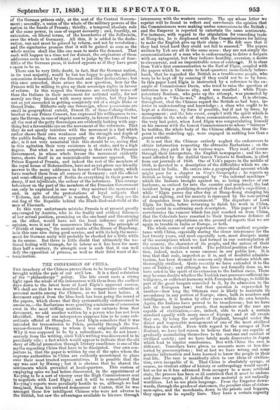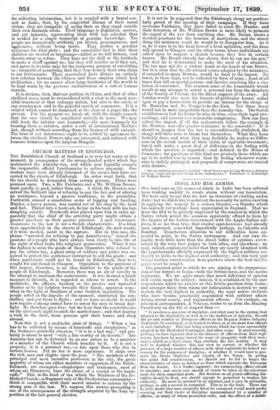THE CONFESSION OF CHINA.
Tim treachery of the Chinese proves them to be incapable of being brought within the pale of our civil law. It is a final refutation of the " philanthropy " policy. The late event casts a strong light upon the whole of the intercourse with them from the earliest days down to the latest hour of Lord Elgin's apparent success. We shall see that he was deceived in his comparative estimate of personal merits among the Chinese, as we had been before. A document copied from the blue-book has been going the round of the papers, which shows that they systematically endeavoured to amuse us,—the Barbarians were granting a minimum of concession even in the most trifling matters. To our extracts from that document, we add another written by a person who has not been _ identified. One of our interpreters supposes him to be some sub- ordinate official at Shangbae. Lord Elgin considers that it was intended for transmission to Pekin, probably through the Go- vernor-General Hwang, to whom it was originally addressed. Why it was supposed to be by a subordinate, we do not know ; scarcely from the writing, since Yeh's writing was discovered to be peculiarly vile ; a fact which would appear to indicate that the old story of official promotion through literary excellence is one of the myths regarding China that have to be dissipated. Our own con- jecture is, that the paper is written by one of the spies whom the supreme authorities in China are evidently accustomed to place over their most trusted representatives. It is possible that the spy was sent by Hwang ; but it is obvious that he shared the sentiments -which prevailed at head-quarters. This custom of employing spies we had before discovered, in the appointment of Ke-ying_to be a sort of viceroy over the High Commissioners sent to negotiate with Lord Elgin ; and it will be remembered that He-yang's reports were peculiarly hostile to us, although we had imagined, from his outward demeanour at Canton, that he was amongst those few intelligent Chinese who were not adverse to the British, but saw the advantages available to his race through intercourse with the western country. The spy whose letter we reprint will be found to reflect and corroborate the opinion that the Commissioners were making undue concessions to the British ; and the Emperor is reported to entertain the same sentiments. For instance, with regard to the stipulation for conceding trade at Hang-ko, he is displeased with the Commissioners for failing to make the English give up their claim : " He felt sure that if they had tried hard i they could not fail to succeed." The papers written by Yeh are all n the same sense : they are not simply the communications of a man who is endeavouring to drive a bargain with an antagonist, but they indicate hostility, aversion, a desire to circumvent, and an impenetrable sense of contempt. It is clear from Yeh's first communication to the Earl of Elgin, coupled with the papers which he wrote to head-quarters immediately before- hand, that he regarded the British as a troublesome people, who were to be kept off by cunning if they could not be so by force. In this paper Lord Elgin is instructed by a reference to the ex- ample of Commissioner Davis, who tried to raise the question of intrusion into a Chinese city, and was recalled ; while Pleni- potentiary Bonham, who .gave up the attempt, was promoted by being made a "Ba-la-wei, ' Anglicd, a Baronet. It is obvious, throughout, that the Chinese regard the British as bad boys, in- ferior in understanding and knowledge ; a class who ought to be kept at a distance, by force if possible, but if not by force, by management ; and the late event, couple" with the spirit which is discernible in the whole of these communications, shows that, to the very last point, when Lord Elgin was congratulating himself on his success with the honest Commissioners to whose " fairness" he testifies, the whole body of the Chinese officials, from the Em- peror to the underling spy, were engaged in nothing less than a grand swindle.
It is not that the Chinese entirely neglect the endeavours to obtain information respecting the obtrusive Barbarians ; on the contrary, they pick it up in various ways. They read, of course through their interpreters, the English newspapers ; and the re- ward afforded by the dutiful Queen Victoria to Bonham, is cited from ourjournals of 1850. One of Yeh's papers in the middle of 1858, is devoted to a description of the difficulties which we en- countered in India. He enters into a geographical account which might pass for a chapter in Guy's Geography ; he reports us British as being terribly scourged by " the infernal machines " which the Indians brought against us, as losing twelve of our harbours, as enticed far into the country and murdered, the last incident being a gratifying description of Havelock's expedition • while " Elgin passes day after day at Hong-Kong stamping his feet feet and sighing, and his anxiety is increased by the non-arrival of despatches from his government." The departure of Lord Elgin for India, before returning to finish his work in China, would assist in confirming such description. This paper of Yeh's corroborates the rumour which has just reached us from China, that the Celestials have resorted to their treacherous defiance of their own treaty stipulations on the ground of reports that we are again in trouble in India or Europe, or both. The whole course of our experience since our earliest acquain- tance with China, especially during the closer intercourse for the last twenty years, and most especially now, must dissipate many of the assumptions which we had formed in our contemplation of the country, the character of its people, and the nature of their relations to the civilized world. The political position of that na- tion, indeed, makes a casus omissus in our public law. It is true that that code, imperfect as it is, and of doubtful adminis- tration, has been deemed to concern only those nations which are thoroughly civilized. Quite recently we have extended it to the case of Turkey ; and although we have not formally done si), we have acted in the spirit of its extension to the Indian races. There may be some doubts whether the Turkish race possesses sufficient in- telligence, or sufficient harmony with European feelings, to fulfil its part of the great bargain conceded to it, by its admission to the pale of European law ; but that question is superseded by another—how long the Ottoman race is likely to maintain its ascendancy in any portion of Europe, since, both in numbers and intelligence, it is beaten by other races within its own bounds. Again, the Indians have proved to be treacherous ; but we have had the most important proofs, that members of the race are capable of civilization,—are, indeed, able to reach a certain standard equally with many races of Europe ; and at all events they are, by being the subjects of England, brought under the direct and responsible management of one of the most civilized States in the world. Even with regard to the savages of New Zealand, we have had reason to believe that they are capable of gradually assimilating themselves to the customs and conduct of civilized society ; and we have lately made discoveries in Japan which lead to similar conclusions. But with China the case is different. Travellgrs have given us accounts more or less dis- torted by preconceptions ; but at last we have wrung out some genuine information and have learned to know the people in their real life. The race is manifestly alien to our ideas of civiliza- tion, even incapable of it. That China is absolutely savage, of course, no student either of history or anthropology would assert ; but so far as it has advanced from savagery to a more artificial state, the process has been so ill contrived that it must be undone and done over again, if indeed the raw material is not radically. worthless. Let us use plain language. From the Emperor down- wards, through the grades of statesmen, the peculiar class of states- men-spies, and the merchants, down to the priests and beggars, they appear to be equally liars. They have a certain capacity for collecting information, but it is coupled with a brutal con. ceit so dense, that, by the congenital disease of their moral vision, they are incapable of seeing feats as they stand outside their own hmtastic circle. Their language is disjointed, operose, and yet infantile, reprenting ideas with less cohesion than is needed for a simple transcript of genuine knowledge. The people are fantastically artificial, yet brutal, presumptuous, and aggressive, without being brave. They profess a peculiar reverence for filial piety; and the correlative fact is that their children are treated as surplusage—killed as we kill kittens, and thrown away as refuse. They have not the skill or the fortitude to make a steal against us ; but they will murder us if they can, and agree to treaties only for the temporary purpose of outwitting us ; incapable of perceiving that they thus destroy their own claim to our forbearance. These ascertained facts dictate an entirely new relation between the Chinese and those empires which lead civilization ; for we cannot allow large territories of the world to be kept waste by the perverse exclusiveness of a sort of human vermin.
It is obvious, then, that our position in China, and that of other civilized races, must be reconsidered with a view to the most mer- ciful treatment of that unhappy nation, but also to the safety of our countrymen and to the peaceful march of commerce. It is a subject which cannot be dismissed at the close of a paper like the present. For the moment we break off, with the simple remark that the case should be considered entirely de novo. We may still treat the inferior race humanely,—the more humanely for treating them as inferior, under a sort of international Martin's Act, though without according them the licence of wild animals. The laws of our intercourse ought to be settled by agreement be- tween the civilized Powers who are interested, and enforced with humane firmness upon the helpless Mongols.



























 Previous page
Previous page